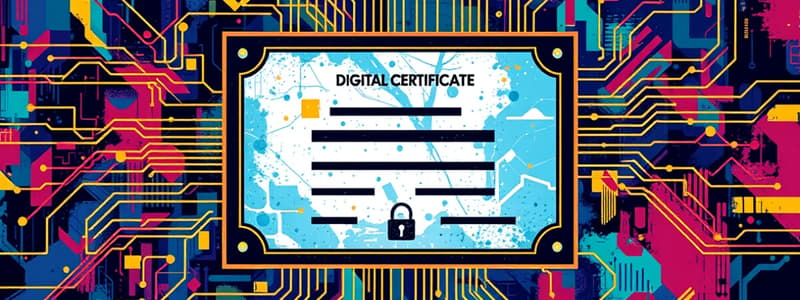Podcast
Questions and Answers
What is a digital certificate used for?
What is a digital certificate used for?
List the contents of a digital certificate.
List the contents of a digital certificate.
Owner's name, Owner's public key, Name of the issuer, Digital signature of the issuer, Serial number of the digital certificate, Expiration date of the public key.
Who manages digital certificates?
Who manages digital certificates?
What are the duties of a Certificate Authority (CA)?
What are the duties of a Certificate Authority (CA)?
Signup and view all the answers
What is a Certificate Signing Request (CSR)?
What is a Certificate Signing Request (CSR)?
Signup and view all the answers
What are the identification methods of a Registration Authority?
What are the identification methods of a Registration Authority?
Signup and view all the answers
What is an Online Certificate Status Protocol (OCSP)?
What is an Online Certificate Status Protocol (OCSP)?
Signup and view all the answers
What is the main difference between a personal digital certificate and a server digital certificate?
What is the main difference between a personal digital certificate and a server digital certificate?
Signup and view all the answers
List the life cycle stages of a certificate.
List the life cycle stages of a certificate.
Signup and view all the answers
What does SSL stand for?
What does SSL stand for?
Signup and view all the answers
What is the purpose of key escrow?
What is the purpose of key escrow?
Signup and view all the answers
What does the trust model refer to in digital certificates?
What does the trust model refer to in digital certificates?
Signup and view all the answers
What is IPsec used for?
What is IPsec used for?
Signup and view all the answers
What are the main categories of digital certificates?
What are the main categories of digital certificates?
Signup and view all the answers
Study Notes
Digital Certificates
- Digital Certificates link user identity to a public key, signed by a trusted third party.
- Contains critical information: owner's name, public key, issuer's name, issuer's digital signature, certificate serial number, and expiration date.
Entities Managing Digital Certificates
- Certificate Authority (CA): Issues digital certificates and maintains trustworthiness in the certificate ecosystem.
- Registration Authority (RA): Subordinate entity that handles certificate requests and user authentication.
- Certificate Repository (CR): Central directory for storing digital certificates and their status.
Certificate Authority Functions
- Responsible for generating, issuing, and distributing public key certificates.
- Publishes status information and manages revocation requests.
- Ensures security and continuity of certificate issuance.
Registration Authority Duties
- Processes certificate requests and revocation requests.
- Authenticates user identities and verifies public key ownership.
Revocation and Status Checking
- Certificate Revocation List (CRL): Lists revoked certificate serial numbers.
- Online Certificate Status Protocol (OCSP): Enables real-time certificate status lookups through a responder.
Digital Certificate Categories
- Personal Certificates (Class 1): Issued to individuals for email security, requiring basic identity verification.
- Server Certificates (Class 2): Certifies web server authenticity and secures connections.
- Software Publisher Certificates (Class 3): Validates integrity and security of a developer's software.
Trust Models
- Hierarchical Trust Model: One master CA signs all digital certificates.
- Distributed Trust Model: Involves multiple CAs for workload balancing and security.
- Web of Trust: Based on direct trust, lacks centralized authority for signing certificates.
- Bridge Trust Model: Facilitates connection between CAs without issuing certificates.
Certificate Policy and Management
- Certificate Policy (CP): Established rules governing PKI operations.
- Certificate Practice Statement (CPS): Details CA's management practices for certificates.
Key Management Practices
- Key Life Cycle includes Creation, Suspension, Revocation, Expiration.
- Proper key management involves secure key storage, handling, and usage procedures.
Cryptographic Transport Protocols
- SSL (Secure Sockets Layer): Protocol for secure communications; current version is 3.0.
- TLS (Transport Layer Security): Successor to SSL; versions include 1.0, 1.1, and 1.2.
- Secure Shell (SSH): Secure alternative to Telnet for remote computer access.
IPsec Protocol
- Protects IP communications through authentication, confidentiality, and key management.
- Supports Transport Mode (encrypts only data) and Tunnel Mode (encrypts both header and data).
Additional Concepts
- Heartbleed: Critical vulnerability in OpenSSL enabling unauthorized access to sensitive data.
- Cipher Suite: Specific set of algorithms for encryption and authentication in SSL/TLS.
- HTTPS: Combines HTTP and SSL/TLS, operates mainly over port 443 for secure web communication.
Studying That Suits You
Use AI to generate personalized quizzes and flashcards to suit your learning preferences.
Description
Explore the key concepts of Advanced Cryptography through these flashcards focused on Chapter 6. Each card provides definitions and details about essential terms, like Digital Certificates, to enhance your understanding of the subject. Perfect for quick revision and mastery of cryptographic principles.




